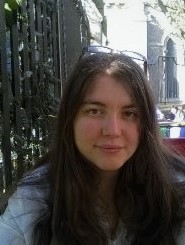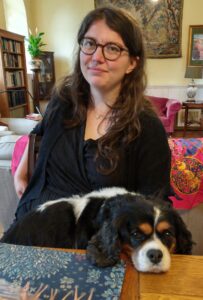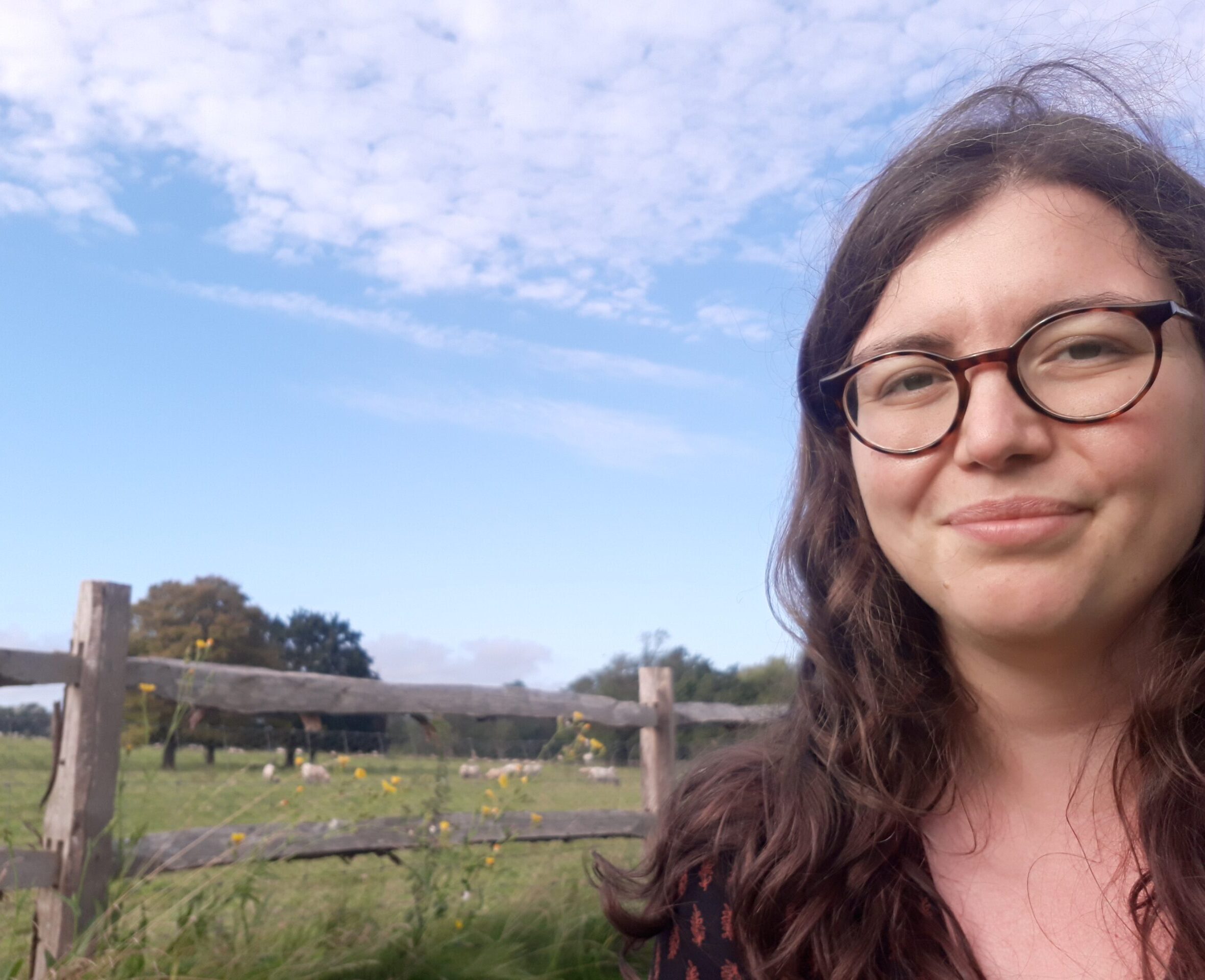As we digitally dash ahead, holding more and more of our world in our hands, it becomes easier to forget about physical libraries and their importance to community, democracy and learning. And in forgetting, we risk losing sight of the hands-on educational services that librarians provide for the public good.
I’m pleased to introduce a librarian whose personality, honesty and creative writing are easy to remember.
Olivia Payne of London — our Featured Writer for Alphabet Box’s fifth issue — and I covered many topics including her two featured pieces, Summer to Spring and The Unbuilder, making a living writing, inspirations, balancing the autobiographical with the fictional, Ukraine writers, burrata, and wild swimming. I hope you find a helpful perspective in reading my interview with Olivia. — Stephen FitzGerald, Alphabet Box editor.
On the craft of writing.
Were there early influences that got you writing on a sustained basis?
I can’t remember a time when I didn’t write things or want to be a writer — although admittedly I also at some point wanted to be an actor, pop star, spy. Writing definitely came from my parents: my father was an English teacher, my mother a librarian and a poet. I grew up seeing them read and discuss books and writing, and we had books in every room of the house — including the bathroom. Literature wasn’t an additional thing, it was one of the main things in life, alongside eating and sleeping.
up seeing them read and discuss books and writing, and we had books in every room of the house — including the bathroom. Literature wasn’t an additional thing, it was one of the main things in life, alongside eating and sleeping.
The first “book” that I tried to write was a complete Jacqueline Wilson rip-off called Sweet & Sour. I was in primary school, so maybe around eight or nine. I sent a pitch to Random House and I still have their rejection somewhere.
To skip ahead a few years, a book that changed how I thought about writing and perhaps drove me more towards prose was Nausea by Sartre, which I read at 17 — until that point, I thought all books had to be primarily plot-focused.
Has there been a time since when you didn’t write?
While there have been times where I’ve written less, I’ve never taken a conscious break. Writing is my primary means of understanding and reflection, so even if I’m not writing I’m usually thinking about it.
How would you compare your writing today to your earliest?
I try not to look back over it too much! One constant seems to be that I veer into the melodramatic or overly macabre, a lot of death and murder and religious imagery. If I can’t grow out of it, then I guess I have to embrace it and try and do it the best I can.
Some of the mediums have changed. I used to write fan fiction, which I hope is lost in the depths of the internet, and I also used to write a comic-strip for my friends. I used to write a lot of poetry as a teenager, very inspired by David Berman’s collection Actual Air, and then I basically stopped at university and turned to prose.
Returning to poetry recently has been extremely joyful for me, even though the catalyst for doing so was the death of my uncle. In a moment of extreme sadness, I found that what I wrote about him was more uplifting than what I thought I was going to write.
Are you working on a project now?
I’m currently doing final edits on my first novel — Machines for Living — after the Le Corbusier instruction that a house should be a machine for living. And it would be great if I very quickly — in the next few days — evolve into a writer with a very clear idea of plot and structure. My goal is to start querying soon.
I’m currently struggling with allowing a sense of lightness or hope into my longer writing. It sometimes feels disingenuous to write too hopefully, or to suggest a larger purpose that I don’t always feel. But then on the other hand, I’m not a nihilist or always miserable, so presenting a world of darkness is really just as false as portraying a world of light. I guess I’m still finding a balance.
Do you seek any sort of balance when autobiographical and fictional aspects of writing intersect?
I find that in prose what can start as autobiographical turns into fiction as the characters develop, they have their own reactions and responses. Sometimes, I have to go back to the original autobiographical element and change it completely to fit the new people it’s happened to. I get worried when prose remains too autobiographical, that usually means I haven’t worked enough at it.
With poetry, it feels different. The poem is the autobiography of the poet of the moment, it’s sort of like shedding skin. So it feels right to be revealing.
Do you think creative writing matters more or less than it did five years ago?
Firstly, I feel like every few years the media goes through a crisis about writing, or says that something modern is coming up as the new, important art form, or replacement. But language is central to our lives, our entire way of understanding. We’re always going to express ourselves in words, orally or visually, written down on paper, signed with our hands, up on the internet, whatever. So in that way, creative writing will always matter on a personal level.
In terms of wider culture, I feel like books “mattering” as profit has become more and more evident, perhaps through things like Twitter or BookTok. That is a definite, negative change that I’ve observed. It often feels like art in general matters less culturally — it’s treated like the cherry on top of the ice cream of society, rather than as a vital ingredient. Or maybe it’s the cone holding the ice cream? Perhaps something I need to work on as a writer is coherent metaphors.
I often struggle with the idea of writing mattering more in times of crisis. For example, whilst it is wonderful to have more writing being translated and published from Ukraine, it is also depressing that these writers are not being upheld as individuals, that the quality of their writing is not the central thing, but the immense suffering of their nation is what matters to us. There is the implication that once Ukraine is out of the news, it will not matter.
Writing is a response to everything, not just what “matters” at a particular moment.
On being a librarian.
You mentioned your mother was a librarian. When did you decide you wanted to be one? How did your decision to work in a library come about?
Oh, these questions hurt a little bit because they imply I must have made a definite choice. I’m afraid I went into library work because I couldn’t stick out all the unpaid internships needed to get into publishing, and I was applying to job after job with no success. I guess I thought that being a librarian was a bookish career that would suit me, and I have stuck with it.
What have you learned so far?
That most people think of libraries as places they went to “as a child” and not places that are still functioning now. Go to your public library! The books are still free! They have Wi-Fi!
I definitely use my library — both the one I work in and my public library — a lot more now, and I’m embarrassed that I didn’t before. I’m saving a lot of money and reading books I might not have considered buying.
Also, as a school librarian for a number of years, I’ve learnt a lot from authors I have come in to talk with students. Listening to them try and explain their craft to seven-year-olds is enlightening.
Working with young children in general is something I never thought I would do and it was fairly challenging. It took me a while to realise that the children in my care really appreciated me setting firm expectations and boundaries, rather than just giving in to what I thought they wanted so they would like me. That was hard, and I was never very good at it.
Have you learned anything surprising?
A lot of librarians are not big readers!
Also, working in a library involves a lot more physical activity than you might think, in terms of moving lots and lots of books around all day.
On your featured pieces.
What was the genesis of Summer to Spring?
Summer was the first piece of flash I had written in a while and I wanted to get it as compact as possible.
The “field filled yellow” is a real place, farmland near where my boyfriend is from. Coming from the suburbs, and currently living in London, there are very few places that I feel I know seasonally, where I see a natural change. So much of my surroundings are man-made and static. Being in this field, filled with rapeseed, and having walked through it when seeds were still growing, coming back when the flowers were dying — it felt that I understood something important, even if also very basic and obvious.
There is a quote from Sergei Dovlatov’s The Zone that I often think about… “at the price of enormous sacrifices, I came to understand what people have tried to instill in me since childhood.” As an adult, I feel like so much learning is relearning and just trying to pay attention. That is partly what I wanted to get at.
Summer to Spring went through a lot of revisions. My intention was that I wanted the reader to feel not existential dread but an existential joy, and excitement, a sense of possibility. I hope it’s successful.
What prompted you to write The Unbuilder?
I live in a studio flat with my partner. When one of us is having a bad time, that bleeds into our tiny space together. I feel guilty when I’m the person bringing bad energy into our home, and also on the other side when I’m witnessing someone I love go through something and I can’t seem to help.
On a literal level, with the cost-of-living crisis and housing crisis, crisis, crisis, crisis, the ideal that we’ll ever buy somewhere of our own, somewhere nices, that we actively like, feels impossible sometimes.
On a more abstract level, the anxiety is more about what it means to “build a life” together, and worrying that I’m failing, or resentful about being failed. I often feel like if we lived in a bigger space, I would be a better partner, and I hate that.
The Unbuilder was quite a different writing experience. It felt more like writing down a long, drawn-out sigh. I wanted to just get it down and out.
On making a living.
In your opinion, for most writers, how likely is the prospect of making a living from only writing?
Very unlikely. Many, many people have told me not to quit the day job. I don’t personally know anyone who makes a living just by writing.
What do you think is realistic?
That entirely depends on personal circumstance, but I think the ideal is working part-time. I think a lot of people aspire to be like the writers we’ve all heard of, get up at 4:00 before their day jobs and cranking out words, but that just isn’t doable for a lot of people.
It just feels false to compare writing to an occupation, it’s really self-employment. I’m producing something that I own, and whilst it is hard work, it’s also deeply rewarding, sometimes even fun.
Is there another question relevant to the topic?
I have not a question but a comment. Being published by Alphabet Box marks the first time I’ve actually been paid for my writing!
I totally understand why some magazines have fees, but even with free submission windows it can sometimes feel like a self-indulgent money pit.
I don’t have an answer, but something to ask might be how do you prioritize where to submit? What is more enticing, a potential money reward, knowing they promote on social media, having your name attached to an established outfit, being part of a community, just being read at all? With so much stuff out there, and the chances still so slim, it can be overwhelming.
On miscellany.
 I frequently ask… what’s your favorite pizza?
I frequently ask… what’s your favorite pizza?
I’m actually not the world’s biggest pizza fan, but any pizza is immediately improved by burrata. It’s the most decadent and also the most ridiculous thing.
You’re @OliviasLitLife — how do you view Twitter’s writing community?
I honestly find it a little intimidating. It’s hard to feel like I’m representing myself honestly on Twitter, there’s often an impulse to frame things or use language in a way that I think might get likes or engagement. It sometimes feels more like a marketplace.
What are you reading for pleasure?
I’m reading more non-fiction at the moment. I’m at the stage of working on my novel where reading other fiction just makes me feel bad. How could I ever write a novel, what if I accidentally steal parts of this novel I’m reading, etc.
I’ve just finished reading Beyond by Stephen Walker about the space race. I became a little obsessed with Yuri Gagarin over lockdown. It’s hard to explain, so in the immortal words of Mean Girls… “I just have a lot of feelings.”
Have you ever been to Cleveland, Ohio?
Not that I’m aware of. I have an American mother and so am a U.S. citizen born abroad. I’ve visited California where I have family.
I’ve lived in England all my life. Usually the first thing people ask when we meet is if I’m American. I absolutely hate having this conversation. I don’t know what people want out of it. Most English people hate America but find it weirdly exciting. They seem so disappointed when I say I’ve never lived there.
What living and deceased people inspire you the most?
This is difficult. There are writers I admire but who I don’t find directly inspirational, like Tolstoy, and writers who inspire my work but who I definitely don’t want to be like, like Shirley Jackson. I’m sorry, Shirley!
I’m inspired by Lorrie Moore, Edna O’Brien, David Foster Wallace. I’m afraid a lot of non-artists don’t stick in my mind… because I think writing is where I need inspiration the most.
Do you have hobbies, or a passion other than writing?
Very few. One thing I do try and enjoy regularly is wild swimming, although my options of places to go are somewhat limited. The cold means you have to be present and extremely aware of your body.
I think the coldest temperature I have swum at was around 2°C., which is 35.6°F.
As an aspiring “polar bear” who hasn’t yet taken the plunge, that’s impressive and shivering!
Olivia, again, congratulations on being selected Featured Writer. There were more than 850 pieces submitted for this issue. And thank you for spending time with me and Alphabet Box.
This is my first writer interview, how did I do?
Thumbs up!
Become an Alphabet Box Patron.
Tips Help AB Publish and Pay Writers!
Log in to manage your payments
